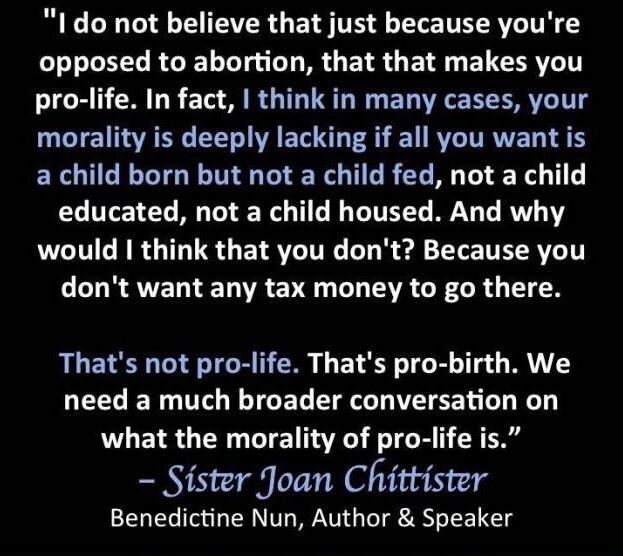I don’t often make a big deal out of this, but I’m personally pro-life.
Politically, I hasten to add, I’m pro-choice.
If somehow it were to be a situation where I was personally involved and my opinion was asked, I’d try to find a way to be pro-life… but I’d also acknowledge that the decision is not mine to make. I mentioned this before in “Pro-Choice and Anti-Abortion“.
Unfortunately, the problem I mention there and in “On Any Given (Pro-Life) Sunday” still plagues us:
The pro-life movement isn’t actually pro-life. It’s only pro-birth.
I wrote the essay below back around the turn of the century, when I was still a practicing member of the Church (hence the change in tone after the break below). It’s sad that it’s still true today.
It’s sad that after more than a decade of people pointing this out, the “pro-life” movement is still more concerned with abortion than with life.
And it’s not just me saying it either:
It is a common “pro-choice” argument; at some point we’ve all heard it, thought it, or maybe even said it.
“Why should I bring an unwanted child into the world?”
I thought about it before my first son was born, but not in the way it’s usually meant. This question can lead quickly into arguments about adoptions and orphanages, but that’s wasn’t it. His mother and I discussed abortion just long enough for us to agree we were both strongly against it, and it was settled.
What kept bothering me was the implied question, the one behind the common argument. Why expose a child to all of… this?
Why bring another child into poverty? Why bring another child into a world torn with war and violence, where pollution is increasing, where children labor for pennies to produce disposable products for our leisure? With all the negative things in the world today – crime, racism, bad schools, the list goes on – why would anyone want to subject another innocent to any of these things?
I am lucky. Most of these don’t personally affect my family. But what about those who aren’t such fortunate sons, no matter where they live? How can I tell those parents-to-be that thier concerns don’t matter? How can I tell them that they should bring thier child into this world? How can I convince them to bear, love, and care for a child who may suffer as much as they have, or worse?
That is when I realized something I didn’t want to admit. The “pro-choice” people were right.
We all – on both sides of this divisive issue – want the best possible for our children. We don’t want children, innocents, to suffer. I have hope and and faith in God’s plan. For those who do not share that faith, though, that isn’t enough.
The pro-life movement doesn’t – and cannot – offer a universal, convincing argument that thier children won’t needlessly suffer. I could think of no rational reason why those already facing the horrors of the world should allow that to happen to thier unborn children.
The next step then became obvious: the “pro-choice” argument must be proved wrong. Proved wrong not by rhetoric, but by our actions.
“Pro-life” cannot simply be synonymous with “anti-abortion”, even if that’s what it is now. We can’t just be “anti-abortion” – not if we wish to be honest to ourselves, not if we want to have others to share the hope for all children. The pro-life movement must fully live up to its name to counter the “culture of death” in all forms.
Protesting at clinics, harrassing doctors and nurses, and other actions to stop people aren’t answering the very real problems in our world. We need to give all people – and thier unborn children – hope.
We must work to end the causes of abortion, the things that make abortion a desirable option, the horrors that plague our world. This is no simple task.
Sweatshops, war, terror, poverty, starvation, illness, racism, injustice – all these things are intertwined with the cause to which we are committed.
“Pro-choice” advocates rightly point out that abortions happened before Roe vs. Wade. Outlawing abortion will not make it suddenly cease. Simply denying abortion – even though justified – promotes despair rather than promoting life. The pro-life movement should not – cannot – be concerned only with whether someone is alive, but also with the quality of that life. We must make it so that no one would ever want to have an abortion. Rather than the tired tactics of fear and hatred, we must instead offer hope.
It may take decades to reduce – let alone remove – these causes of abortion. We may not ever be able to remove them all. Still, we must try.
After all, it’s for the children.

